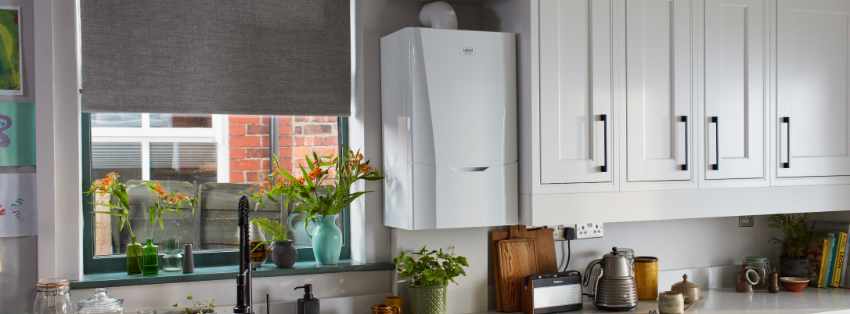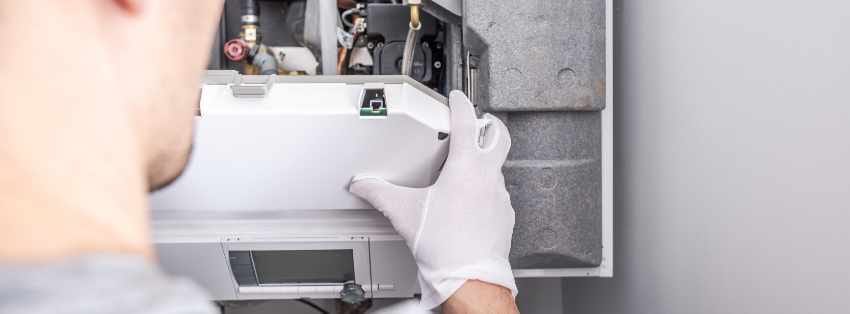It’s always the same story — the temperature drops, you switch the heating on, and the boiler refuses to play ball. No hot water, no radiators, and panic sets in.
Before you imagine the worst, take a breath. A lot of boiler problems have simple causes, and a few safe checks could save you time, money, and an unnecessary callout.
Here’s what to do before you reach for the phone.

1) Check the Power Supply
It might sound obvious, but the power supply is one of the first things to confirm.
- Make sure the boiler switch is on and the fuse spur hasn’t tripped.
- If you have a smart plug or energy monitor, check that it hasn’t been switched off or lost connection.
- Look for display lights or at the boiler screen — if it’s completely blank, there’s a good chance it’s just lost power.
If other appliances nearby have stopped working too, it may be a fuse or circuit issue rather than a fault with the boiler itself.
2) Check Your Thermostat and Heating Controls
A surprising number of “boiler breakdowns” are actually control or timer issues.
- Make sure your thermostat is set above room temperature.
- If you have a programmable timer or smart thermostat, check that the heating schedule hasn’t changed — daylight-saving time or a power cut can easily reset it.
- If the thermostat has batteries, try replacing them.
Once you’ve adjusted settings, wait a few minutes to see if the boiler kicks in.
3) Check Your Boiler Pressure
Low pressure is one of the most common causes of heating failure. If your boiler has a pressure gauge, look for the needle — it should sit around 1–1.5 bar when the system is cold.
If it’s lower than that, follow your manufacturer’s guide to top it up using the filling loop (usually a small silver hose underneath the boiler).
Do it slowly and stop once the gauge reaches 1.2–1.5 bar. If you’re not sure, or if the pressure drops again quickly, it’s time to call a Gas Safe engineer. Constant pressure loss usually means there’s a leak or faulty component.

4) Reset the Boiler
Modern boilers often lock out when they detect a fault. A simple reset can clear minor errors caused by power cuts, low pressure, or temporary sensor issues.
Find the reset button on the front of your boiler (or behind a flap) and press it once — don’t hold it down unless your manual says to. Wait for the system to restart fully, which may take a minute or two.
If the fault code reappears or the boiler locks out again, don’t keep resetting it. Repeated resets can mask an underlying issue.
5) Check for Error Codes or Warning Lights
If your boiler has a digital display, it will usually show an error code when something’s wrong. Make a note of it before calling for help.
When you speak to an engineer, that code helps them diagnose the issue faster — meaning a quicker fix and fewer visits.
If you don’t see a code but notice flashing lights or unusual sounds (banging, gurgling, whistling), mention those too. They can tell us a lot about what’s going on.
You can also check our Boiler Error Code Guide to see what your display message means before calling.
6) Look for Obvious External Issues
Sometimes the problem isn’t the boiler at all:
- Condensate pipe frozen? In very cold weather, the plastic pipe that drains condensation can freeze, blocking the system. You can thaw it gently with warm (not boiling) water.
- Radiators cold at the top? They might just need bleeding. Check our guide on why radiators don’t heat evenly.
- No gas or oil supply? Check other gas appliances or your oil level if you have an OFTEC-registered system.
If you’re confident the issue is outside the boiler itself, fixing it can get things running again quickly.

7) When to Stop and Call a Professional
Some situations aren’t safe to handle yourself. Stop and call a qualified Gas Safe engineer if you:
- Smell gas or suspect a leak.
- Hear loud banging or metallic noises from the boiler.
- See visible leaks or dripping.
- Notice your boiler losing pressure repeatedly.
- Have reset the boiler but it immediately fails again.
These could point to problems with valves, pumps, or combustion components — jobs that must only be handled by registered professionals.
8) Preventing Future Breakdowns
The best way to avoid winter breakdowns is through regular maintenance. Annual servicing catches issues early, keeps your warranty valid, and ensures the boiler runs efficiently when you need it most.
At GH Heating, we offer Boiler Care Plans that include:
- Annual servicing reminders and priority bookings.
- Routine maintenance to prevent breakdowns.
- Cover for repairs and parts, depending on your plan level.
- Flexible low monthly payments.
Our engineers are all Gas Safe and OFTEC registered, so you’re guaranteed safe, compliant work every time.
A Quick Recap
If your boiler stops working:
- Check the power.
- Check the thermostat and timer.
- Check the pressure gauge.
- Try a reset once.
- Note down any error codes.
- Call a registered engineer if it still won’t start or shows warning signs.
A few calm checks can often get things running again — but never take risks with gas or oil systems.
Learn more about our boiler servicing and repairs in Colchester for reliable winter support.
Final Thoughts
Boiler problems never happen at a convenient time, but most of them start small. Regular servicing, a simple pressure check now and then, and a quick response to warning lights go a long way toward preventing bigger failures.
If you’ve done the basics and the boiler still isn’t cooperating, we’re here to help.
👉 Contact GH Heating today for fast, reliable boiler repairs and Care Plan cover across Colchester, Essex, and the surrounding areas.
We’ll get your heat back on — safely, quickly, and with expert care.